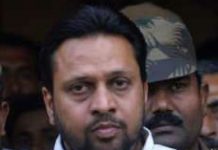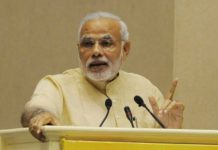The initial response of Russian President Vladimir Putin to the Moscow concert hall carnage, which left 139 dead and hundreds injured, was not only a measured one but also hinted at Russia’s potential for serious retaliation. A report by Gopal Misra

In this era of technology, sooner or later, the real perpetrators of the Moscow carnage would soon be exposed. The initial response of Russian President Putin was not only a measured one, it also indicated that serious retaliation might be contemplated to the Moscow’ bloodbath of March 23, thus triggering sectarian violence across the continents. It is not surprising that this apprehension has sent shivers down the spine of European leaders.
A few weeks ago, the members of the European Union, who were seen vying with each other in rearming Ukraine with the state-of-the art lethal weapons, appear to have quietened down, at least for a while. They fear that the ongoing conflict with Russia might enter into a new phase of much bigger scale. The use of terrorism, as an effective weapon against Russia might become counterproductive, hitting the European powers hard.
Russia was alerted
It is difficult to predict whether the pre-warning to Moscow from the American authorities cautioning their counterparts in Moscow of an impending terrorist attack would wipe out the suspicion of Washington having played any mischief in the Moscow tragedy. It may also not be possible for India, despite having a close strategic alliance with the West to endorse the American narrative of the ‘terrorist attack’ in Moscow.
Meanwhile, the Biden administration is facing the growing challenge from the former US President Donald Trump in this election year. Trump, despite being implicated in various legal issues, has again become the Republican Party’s nominee, and is pitted against the incumbent president Joe Biden.
Earlier, in 2016, Trump had accused the former President Barack Hussain Obama of promoting terrorism through the dreaded outfit – the ISIS. During the present tenure of Biden, the Republican Party has been accusing it of pursuing Obama policies. Interestingly, Obama’s recent visit to the U.K. too has raised unnecessary controversy linking it with the terrorists’ attack in Moscow. It is being linked with Trump’s statement that Obama has fathered ISIS. The issue is whether the claim of ISIS regarding its attack in Moscow could be acceptable to the world. The western media’s repeated assertion about ISIS’s claim and sharing information about the impending attack on Moscow is being considered as a Western propaganda for exonerating Washington even before a thorough enquiry. The rhetoric may fail to convince not only Russia or China, it will be difficult even for India to accept this much trumpeted narrative.
It is believed that the media noise could just be an attempt to assure that the US proxies did not pre-plan the unprecedented attack ruthlessly killing as many as 139 innocent unarmed people attending the music concert on the spot and leaving hundreds grievously injured. It is being rightly asked whether it has weakened President Putin’s position in his country. The initial reaction among people could be judged by the long queues of the blood donors at the hospitals, where the victims of the violence are struggling for their survival. The final death toll could leap to a much higher number in the coming days.
The media blitzkrieg accompanied by this claim, however, has caused much confusion about the nexus between Ukraine and ISIS. It is difficult to predict whether the appeal of the EU leaders, including the French President, asking Putin not to further escalate the on-going offensive against Ukraine would have any substantial impact. The statement of the Russian security official blaming the US, UK and Ukraine for the carnage indicates that the conflict may adversely affect other regions too.
ISIS has roots on the Afghanistan-Pakistan borders. Its terrorists are at war with the Afghan Taliban; and believed to be armed and trained by Pakistan’s dreaded intelligence agency, Inter Services Intelligence (ISI). The Indian security agencies have already busted a number of ISIS modules in Kerala and in some other areas. With its renewed activities, India too could be targeted any time.
The fallout
The western media has repeatedly asserted that Putin has accused Ukraine of being behind the terror attack, but has so far failed to give any details or evidence. He has also stated the radical Islamists were behind the attack. The arrested terrorists belong to Tajikistan, which was once a republic of the Soviet Union. It is natural for anyone to enquire whether the Tajiks hold any anger against Russia, but so far no evidence or information is available in this regard.
Similarly, it is yet to be probed why Ukraine, a country of orthodox Christians, should use the radical Islamists against Russia, a country following the same Christian cult. Meanwhile, Russian bombing of Ukraine has been further intensified. It indicates that much against the wishes of the US-led western powers, Putin’s domestic political stature continues to be strong and the ISIS attack has further strengthened the resolve of Russians to teach a lesson to Ukraine and the Islamists. The West has to remember that a section of Chechan Muslims also supports Russia. If they are unleashed in this proxy war, Paris and cities in the UK could be facing similar attacks, but it is difficult to predict whether the West would ever learn that peace could never usher in if they continue to escalate violence either directly or through proxies.













